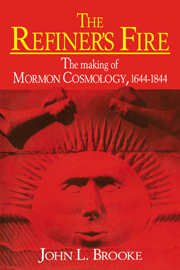Book contents
- Frontmatter
- Contents
- List of Illustrations
- List of Maps
- Preface
- Part I A Prepared People
- Part II Hermetic Purity and Hermetic Danger
- 4 A Urim Spiritual
- 5 Alchymical Experiments
- 6 I Was Born in Sharon
- Part III The Mormon Dispensation
- Appendix The Sectarian and Hermetic Circumstances of Mormon Origins in Vermont and New York
- Abbreviations Used in Notes
- Notes
- Index
5 - Alchymical Experiments
Published online by Cambridge University Press: 30 October 2009
- Frontmatter
- Contents
- List of Illustrations
- List of Maps
- Preface
- Part I A Prepared People
- Part II Hermetic Purity and Hermetic Danger
- 4 A Urim Spiritual
- 5 Alchymical Experiments
- 6 I Was Born in Sharon
- Part III The Mormon Dispensation
- Appendix The Sectarian and Hermetic Circumstances of Mormon Origins in Vermont and New York
- Abbreviations Used in Notes
- Notes
- Index
Summary
Very many persons in the society have asserted that while the money fever raged at Kirtland, the leaders of the [Mormon] church and others were, more or less, engaged in purchasing and circulating Bogas money or counterfeit coin; and a good evidence that the report is not without foundation is that each of these contending parties accuses the other of this crime.
Reed Peck, Quincy, Illinois, September 18, 1839The revitalized hermeticism of the late-eighteenth-century Atlantic world, borne on a Romantic fascination with the occult and on the rise of Freemasonry, carried millenarian themes of the restoration of ancient truths, even the restoration of the powers of the primal Adam. Drawing both upon the magical and perfectionist predispositions of those people inheriting the traditions of the Radical Reformation and upon this revived current of hermetic restorationism, the treasure-divining cults of the early Republic stood in a field of spiritual purity, connected to hopes and dreams for a perfect glory. But the divining cults were also fundamentally focused on the discovery of wealth, and they clearly harbored conning men of many descriptions. Quite simply, divining occupied an ambiguous position in the broader field of hermetic purities and dangers. These hermetic dangers involved money in all its various forms and all its shades of legitimacy, and the deceptions that people practiced in the name of money. The connections between money and hermeticism, legitimate and spurious, already had a long and tangled history by 1830, and they would play a powerful role in the story of the Mormon emergence.
Information
- Type
- Chapter
- Information
- The Refiner's FireThe Making of Mormon Cosmology, 1644–1844, pp. 105 - 128Publisher: Cambridge University PressPrint publication year: 1994
